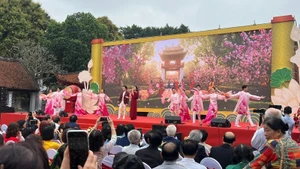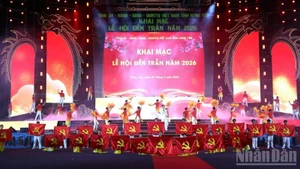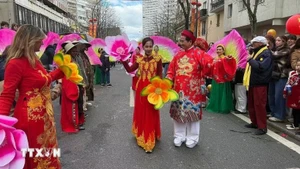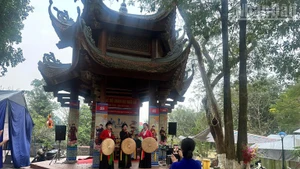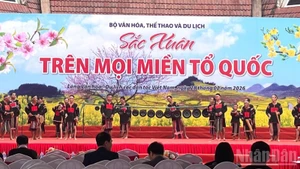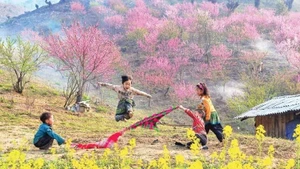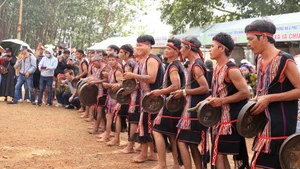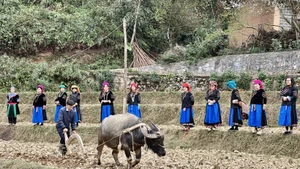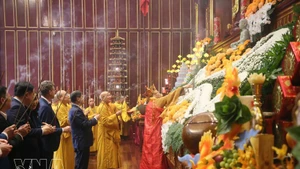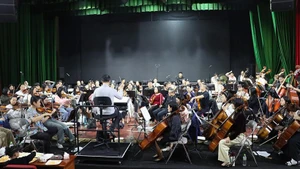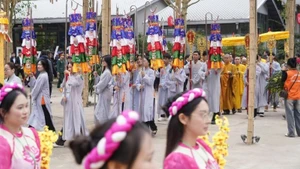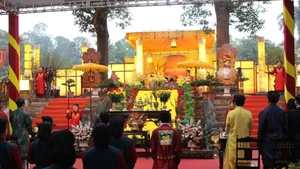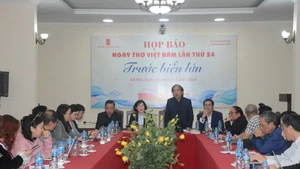The goal is to create a space to promote creativity, develop literature, and inspire authors based on the protection of the political ideological foundation, preservation of cultural values, national identity, and connection with the country's development.
According to the drafting agency, Vietnamese literature has comprehensively and strongly developed over the years, while inheriting and promoting traditional values and national identity. At the same time, it has selectively absorbed the essence of human culture, contributing to building the spiritual foundation of society.
Currently, Vietnamese literature has achieved diversity in terms of creative teams, topics, and creative methods. In the past decade, activities to introduce and promote literature have developed positively both domestically and internationally; meeting the desire to understand Vietnamese literature and culture of international friends.
Foreign literary works translated into Vietnamese are becoming increasingly diverse, helping Vietnamese readers have more comprehensive and profound access to world literature, while at the same time creating conditions for Vietnamese literature to integrate internationally. The online space has provided favourable conditions for the public to easily access, enhancing exchanges between writers, theorists, critics, and readers.
The decree on literary activities must institutionalise the Party's and the State's orientations and policies on culture, literature, and arts, based on the viewpoint of building an advanced literary culture deeply imbued with national identity, for the comprehensive development of the Vietnamese people to meet the sustainable development requirements of the country while at the same time, shaping the legal framework for new issues related to literary activities, literary criticism and arts, etc.
However, state management of literature still has shortcomings, especially at the grassroots level. The understanding of the role of literature at many leadership and management levels is still incomplete, leading to low investment efficiency. Literary activities are being adjusted by many different laws (such as Publishing Law, Intellectual Property Law, Library Law, Cybersecurity Law...), but many literary activities have not been regulated by separate legal documents.
For example, there are no legal frameworks for: assigning tasks; funding for literary creation; translation of literary works; introduction and promotion of literature; competitions; literary creation camps; expert consultation mechanisms in evaluating issues arising in literary life; specifying prohibited behaviours in the field of literature; and so on.
In addition, we still lack profound and artistic works with significant depth reflecting the history and major current issues of the country, while activities of literary theory, criticism, organising literary creation camps, promoting literary activities, literary translation, disseminating literature on the internet, etc., still have many shortcomings.
The decree on literary activities must institutionalise the Party's and the State's orientations and policies on culture, literature, and arts, based on the viewpoint of building an advanced literary culture deeply imbued with national identity, for the comprehensive development of the Vietnamese people to meet the sustainable development requirements of the country while at the same time, shaping the legal framework for new issues related to literary activities, literary criticism and arts, etc.
As literature is a particularly delicate field of culture, the management approach must also be particularly delicate, liberating the creative power of writers. The decree on literary activities must institutionalise the Party’s and the State's orientations and policies on culture, literature, and arts, based on the viewpoint of building an advanced literary culture deeply imbued with national identity, for the comprehensive development of the Vietnamese people to meet the sustainable development requirements of the country; at the same time, shaping the legal framework for new issues related to literary activities, literary criticism, and arts.
The biggest requirement is to clarify the responsibilities and organise state management at the central and local levels in promoting literary activities and the development of reading culture. Furthermore, it is necessary to diversify forms of honouring and promoting valuable works, mobilise the participation of literary associations to establish regulations, criteria in line with the world, and combine copyright protection for authors, including on the internet.
At the same time, the Ministry of Information and Communications has announced the Plan to organise the third Vietnam Book and Reading Culture Day - 2024, including many direct and online activities, to spread reading culture widely in the community. The series of activities of the third Vietnam Book and Reading Culture Day - 2024 takes place from April 15th to May 1st with many profound messages.
In the context of digital technology development, the publishing industry must meet the different reading methods of today's readers to produce suitable products. Where readers are, publishing must be there. And innovation (from book production, distribution, business models, new cooperation...), is the primary trend.
The publishing industry must find ways to conquer both traditional and digital spaces, with the traditional space being expanded and quality improved; while the new space will help to expand the market and create products suitable for contemporary tastes and long-term development. These two spaces are interconnected and complement each other rather than operating independently. A printed book may only reach tens of thousands of people, but books distributed on digital platforms can reach millions of readers, thus the value of books increases and extends much further than before.
The above events are good signals regarding the development of literature and reading culture in the future, with the joint efforts of all levels, sectors, social organisations, and each citizen, thereby contributing to raising intellectual standards, nurturing culture - the spiritual foundation of society.

